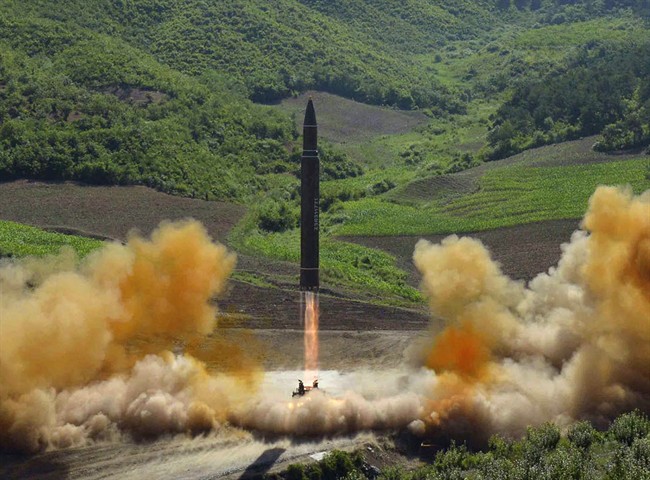As U.S. President Donald Trump and North Korean leader Kim Jong Un argue over who has a bigger red button, the U.S. Centers for Disease Control and Prevention announced a briefing on how the public should respond in the event of nuclear war.

“While a nuclear detonation is unlikely, it would have devastating results and there would be limited time to take critical protection steps. Despite the fear surrounding such an event, planning and preparation can lessen deaths and illness,” the CDC said in a statement on its website. The briefing is scheduled for Jan. 16.
WATCH: Trump says his nuclear button is ‘bigger’ than North Korea’s

The public health event is a teaching session that will include a presentation by two experts in radiation studies — Robert Whitcomb, chief of the radiation studies branch at the CDC’s National Center for Environment Health and Capt. Michael Noska, radiation safety officer at the Food and Drug Administration.
Public health officials like doctors, nurses, first responders, epidemiologists, and laboratory scientists, will get the chance to look at how they play a crucial role in preparing for a nuclear detonation, according to the CDC.

Get daily National news
“Most people don’t realize that sheltering in place for at least 24 hours is crucial to saving lives and reducing exposure to radiation,” the CDC said. “Learn how planning and preparation efforts for a nuclear detonation are similar and different from other emergency response planning efforts.”
READ MORE: Why the North Korea telephone hotline matters for diplomacy

The planned public health information sessions come amid the rising tensions between the U.S. and North Korea.
Earlier this week, one of Trump’s tweets boasted about the size of his “nuclear button” and how it’s “much bigger & more powerful” than North Korea’s.
“North Korean Leader Kim Jong Un just stated that the ‘Nuclear Button is on his desk at all times,’” he wrote on Twitter.
“Will someone from his depleted and food starved regime please inform him that I too have a Nuclear Button, but it is a much bigger & more powerful one than his, and my Button works!”
READ MORE: North Korea accidentally hit its own city in a missile test
Trump doesn’t actually have a nuclear button, but he does have access to the so-called nuclear “football,” a black briefcase which contains an outline of nuclear attack options and instructions for contacting U.S. military commanders around the world to give the order to launch missiles.
It’s carried by a rotating group of military officers everywhere the president goes.
The threat of nuclear conflict has escalated over the last year as North Korea has carried out a series of missile tests.
READ MORE: U.S. won’t defend Canada during North Korean missile attack, official says
In November, the North claimed it had the capability to strike any part of the U.S. mainland. The UN Security Council responded by voting to increase sanctions against the Hermit Kingdom.
However, a positive sign came earlier this week after reports said North and South Korea have agreed to reopen a border hotline to restore communications between the two countries. Talks are expected to focus on the North’s potential participation in the upcoming Winter Olympics, scheduled to be held February in the South Korean city of Pyeongchang.














Comments